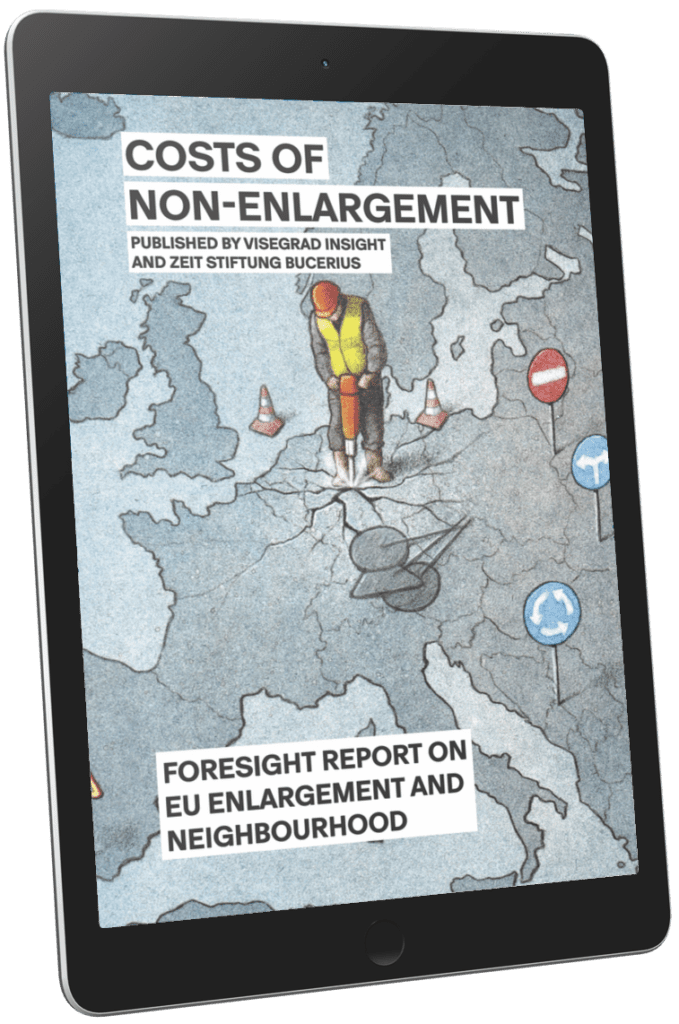Think Tank
Visegrad Insight Breakfasts
Event: CEE perspectives on EP elections
16 May 2024
6 March 2024
Non-enlargement costs are the political and social risks explored through a strategic foresight exercise in partnership with the ZEIT STIFTUNG BUCERIUS.
 It threatens to cripple Europe — stripping away strength, fostering vulnerability and depleting vital resources. This would mark the disappearance of one of the EU’s foremost foreign policy tools for decades to come. Furthermore, it would also leave the EU without its known instrument to manage relations in the neighbourhood.
It threatens to cripple Europe — stripping away strength, fostering vulnerability and depleting vital resources. This would mark the disappearance of one of the EU’s foremost foreign policy tools for decades to come. Furthermore, it would also leave the EU without its known instrument to manage relations in the neighbourhood.The future of the enlargement project is susceptible to numerous apparent and hidden obstacles. Some of those obstacles can be well-intentioned in trying to develop rigid procedural requirements ensuring solid institutional performances. To appease enlargement sceptics, some mid-way solutions have been offered as a compromise, but they only lead to middling results and in the complicated realm of accession, more is needed. Then there are those without good intentions, trying to obstruct the entire proceedings.
How the EU deals with these instances will have far-reaching consequences for the Union itself. Broken accession promises will leave the Southern and Eastern Flanks vulnerable to Russian and Chinese meddling and has the potential to upset the internal cohesion of the Union as well. However, enlargement has the potential to reinvigorate the entire project by deepening integration, facilitating much-needed treaty reforms and providing a positive discussion cleavage for public debate.
The following report outlines the findings of a foresight project led by Visegrad Insight – Res Publica Foundation and ZEIT STIFTUNG BUCERIUS together with a group of over 40 scholars and fellows of both organisations who come from the EU and EU neighbourhood. At the beginning of 2023, the project started by considering the potential of foresight analysis stemming from a decade of research, reporting and networking conducted with scholars and policy leaders on the ground. Besides the review of scholarly research, the joint project has involved consultative meetings with policymakers in Brussels and foresight workshops that produced the scenarios.
Trajectories of Change – Strategic Foresight for EU Enlargement and Neighbourhood fosters exchange between academic and policy networks in Europe and provides policy briefs and recommendations related to the dynamics of EU enlargement with a particular focus on Southern and Eastern Neighbourhoods.

This project aims to facilitate the constructive input of academic networks in the ongoing debate about the long-term vision on the future of Europe. It seeks to overcome an image of recalcitrance associated with the Southern and Eastern Neighbourhoods by elaborating on concrete proposals through extensive workshops, consultations and policy interventions on the future of Europe from the perspective of civil society stakeholders. It gives voice to actors that may not be heard through conventional and state-led channels.
Anna Hofmann
Director, Head of Research and Scholarship ZEIT STIFTUNG BUCERIUS
Wojciech Przybylski
Editor-in-Chief of Visegrad Insight and President of the Res Publica Foundation
